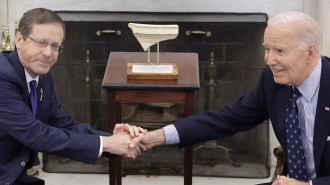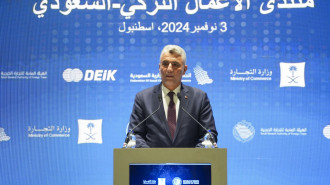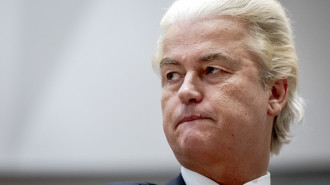France backs Islamist rebels in Syrian peace talks
France strongly supports the line-up of the Syrian opposition's main delegation that will handle negotiations with Syrian regime representatives in the upcoming Geneva talks, including Mohammad Alloush as chief negotiator for the opposition, said a French Foreign Ministry source to The New Arab.
Mohammad Alloush is a member of the political bureau of Jaysh al-Islam, a major Islamist rebel faction active in the Ghouta region, and reportedly a close relative of Zahran Alloush, the leader of Jaysh al-Islam killed in a Russian airstrike.
"France places its full confidence in the negotiating council established by the Riyadh meeting last month," the source added.
The source revealed the French ambassador to Riyadh Bertrand Besancenot had recently spoken to Alloush in Riyadh and was convinced of the man's "seriousness".
"Jaysh al-Islam adopts the principles of the Syrian opposition, which include establishing a democratic, secular and pluralistic Syria, and preserving state institutions," the source told The New Arab.
France believes Jaysh al-Islam's participation would increase its "legitimacy", the source added, owing to its military clout.
Riyad Hijab, the general coordinator of the negotiating council formed in Riyadh, held consultations with French President Francois Hollande and other French officials earlier this month, before the opposition delegation members were selected several days later.
The appointment of Mohammad Alloush as chief negotiator has been met with protest by other opposition factions as well as Moscow, which designates the group to which he belongs as a terrorist organisation.
 |
Jaysh al-Islam adopts the principles of the Syrian opposition, which include establishing a democratic, secular and pluralistic Syria, and preserving state institutions |  |
"The opposition delegation is now ready," George Sabra, an opposition politician also named as a negotiator, told opposition channel Orient TV earlier this week.
Sabra said that only the opposition negotiating council can choose the opposition delegation taking part in the talks and that countries like Russia had no right to object or try to widen the opposition team proposed.
"No country or side has the right to object to the Syrian (opposition) right to propose whoever they want to represent them and no one has the authority to put forward any names other than the council," he said.
The peace talks aim at ending the country's five years conflict and in which more than 250,000 people are believed to have been killed and also at setting up a transitional government and eventual elections.
The United Nations said last Monday it would not issue invitations to peace talks between Syria's government and opposition set to begin on January 25, but may now be delayed, until major powers pushing the peace process reach agreement on which rebel representatives should attend.
The countries driving the diplomatic initiative on Syria include the United States, Russia and other European and Middle Eastern powers, including rivals Saudi Arabia and Iran. But they remain deeply divided over how to settle the war.







 Follow the Middle East's top stories in English at The New Arab on Google News
Follow the Middle East's top stories in English at The New Arab on Google News


